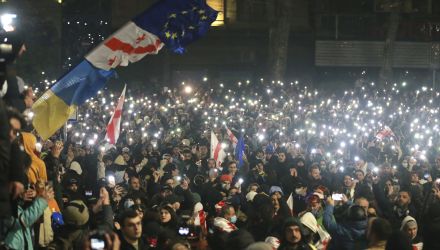BEIRUT -- We now have the interplay between warfare and diplomacy in Gaza, which is a better situation to be in than witnessing only warfare. Yet one of the telling things about the complexity of the current fighting in Gaza is that one does not quite know what to call it. Is it the Israel-Hamas war? The Israel-Gaza war? The Israel-Palestine war?
This matters, because knowing the exact nature of the protagonists doing the fighting and the real underlying issues improves our chances of coming to grips with the full nature of the conflict -- an essential first step to resolving it permanently. Military action by both sides will never resolve the core of the conflict, but diplomacy could if it tackled the most important issues for each side. The UN resolution approved Thursday does not seem to cover all the important issues.
Nearly two weeks into the Israeli assault on Gaza, the UN Security Council resolution approved Thursday calls for "an immediate, durable and fully respected cease-fire" that would lead to the "full withdrawal" of Israeli forces from Gaza, the passage of humanitarian aid to the Palestinians and an end to the trafficking of arms and ammunition into the territory.
This is a welcomed move if it stops the immediate killing and suffering, but it will not achieve anything lasting because it does not address the core issues in the conflict. I would list these as: From the Israeli side, ending attacks by miniature missiles and other small, home-made projectiles into southern Israel; and from the Palestinian side, ending Israel's attacks on and strangulation of the Gaza Strip.
The Israeli aim of ending Palestinian attacks on southern Israel was achieved before and could have been achieved again through the established truce mechanism that Hamas has adopted, and had widely respected several times in recent years. Hamas has also offered Israel a long-term truce, lasting ten years or more.
This is not recognition of Israel, which is a precondition Israel and its Western supporters insist that Hamas accept before they will talk to it. In Hamas' diplomatic body language, though, a long-term truce means that it would no longer fight Israel militarily, and would open the door for credible negotiators on both sides to explore opportunities for a negotiated permanent coexistence or formal peace. Hamas has also stated that any negotiated peace accord should be ratified by a referendum of the Palestinian people -- the mirror image of Israelis submitting their peace agreements with the Arabs to their parliament.
If stopping attacks from Gaza were really the key main aim of the Israeli government, this could have been achieved without the human and political cost of the current war. It seems more realistic to see the Israeli goal as trying to crush Hamas, and end any active political or military resistance to Israel's domination of all historic Palestine, including the West Bank, Gaza and east Jerusalem.
Here is where the name of this little war becomes more relevant. Calling it the Israel-Hamas war is not fully accurate, because Hamas is only one of several important groups that represent the political struggle and national sentiments of the Palestinian people. Hamas is doing most of the fighting, but the political battle with Israel reflects the concerns, rights and aspirations of all Palestinians. That struggle has two main dimensions: the immediate one is ending the siege, starvation and assault on Gaza by Israel, and the longer term one is negotiating a fair and definitive resolution of the problem of the Palestinian refugees of 1948, who were evicted from the land that now forms the state of Israel.
Israel has used such barbaric tactics against Hamas and the civilians of Gaza because it wants to wipe out forever any Palestinian insistence on dealing with the core national and human issues that emerged from the 1948 war and the creation of Israel. Hamas is a troubling reminder for Israel that the state of the Jewish people was created on the ashes of the indigenous Palestinian Arab community -- the community that is now the refugee population of Gaza and other regions in the Arab world. Israel is not just bombing Hamas facilities; it is trying to bomb into oblivion the idea that any single Palestinian man, woman or child can stand up and demand the end of their national dismemberment and exile.
Diplomatic efforts to end the current fighting will succeed if they redress the immediate imbalance in the mutual rights of Israelis and Palestinians to live in security. A UN resolution that stops Hamas attacks and closes the tunnels from Egypt while keeping in place the Israeli starvation siege of Gaza will not work.
It is hard to know how much more death, destruction and suffering the Palestinians in Gaza can withstand. This we do know, however: Wars happen for specific reasons and causes, and they end when those reasons and causes are addressed.
Rami G. Khouri is Editor-at-large of The Daily Star, and Director of the Issam Fares Institute for Public Policy and International Affairs at the American University of Beirut, in Beirut, Lebanon.
Khouri, Rami. “Moving Toward Gaza-Israel Diplomacy.” Agence Global, January 10, 2009




